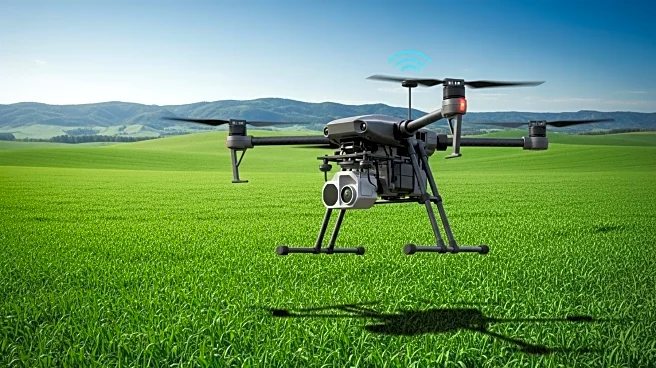What is the story about?
What's Happening?
A recent report by the Association of Equipment Manufacturers (AEM), in collaboration with leading agricultural groups, has highlighted the significant benefits of precision agriculture practices across the United States. The study reveals that these advanced farming techniques have led to substantial reductions in resource use. Fertilizer application has decreased by 8%, avoiding the use of 4 billion pounds, with potential savings of an additional 7 billion pounds. Herbicide use has also declined by 9%, preventing 54 million pounds from entering the environment. Furthermore, farmers have saved 147 million gallons of fuel, equivalent to removing nearly 283,000 cars from the road. Water efficiency improvements are notable, with savings equal to filling 824,000 Olympic-sized swimming pools, and a further 20% improvement is still achievable.
Why It's Important?
The adoption of precision agriculture is crucial for enhancing environmental sustainability and ensuring a stable food supply chain. By reducing the use of fertilizers and herbicides, farmers are minimizing the environmental impact of agriculture, contributing to cleaner ecosystems. The fuel savings translate into reduced carbon emissions, supporting efforts to combat climate change. Additionally, improved water efficiency helps conserve vital water resources, which is increasingly important in the face of climate variability and water scarcity. These advancements not only benefit the environment but also offer economic advantages to farmers by lowering input costs and increasing productivity.
What's Next?
As precision agriculture continues to evolve, further improvements in resource efficiency are expected. Farmers and agricultural stakeholders may increasingly adopt these technologies, driven by both economic incentives and environmental considerations. Policymakers might support these efforts through incentives or regulations that encourage sustainable farming practices. The ongoing development of precision agriculture tools and techniques could lead to even greater reductions in resource use, further enhancing the sustainability of the agricultural sector.
Beyond the Headlines
The shift towards precision agriculture may also influence cultural and ethical dimensions of farming. As technology becomes more integrated into agricultural practices, there may be discussions around the balance between traditional farming methods and modern technological approaches. Ethical considerations regarding data privacy and the use of technology in agriculture could emerge as precision tools become more prevalent.
















